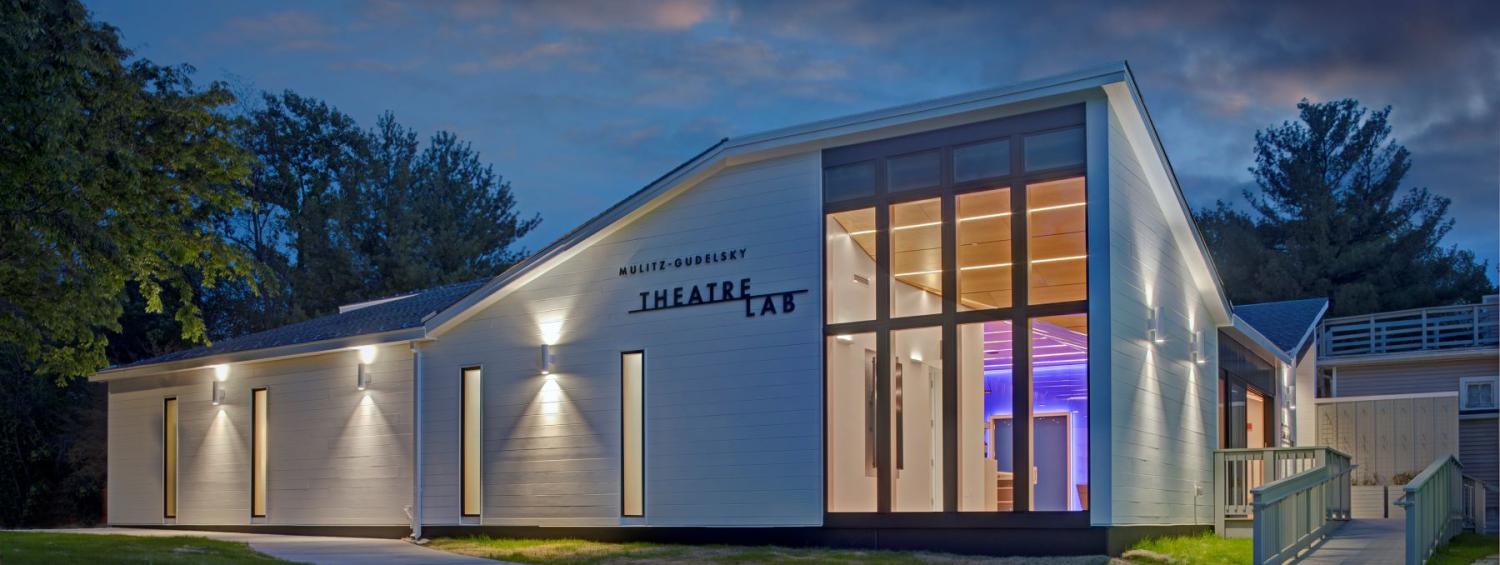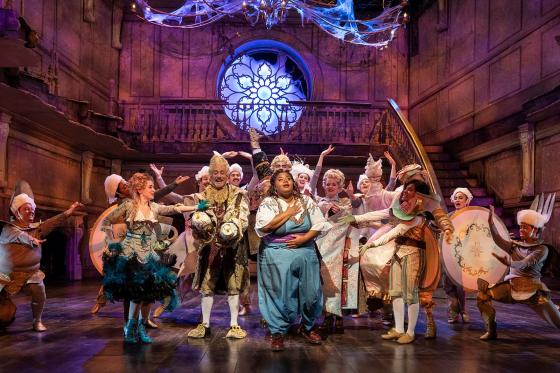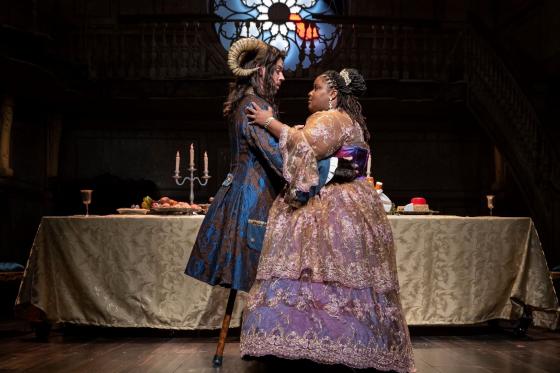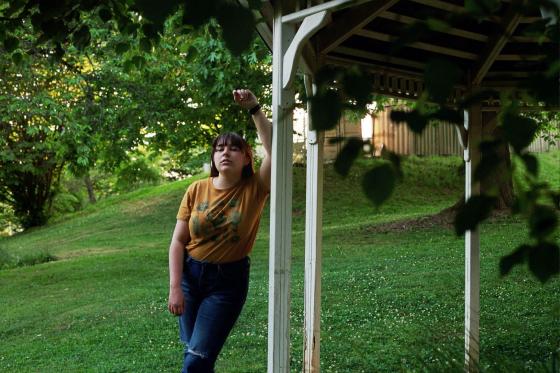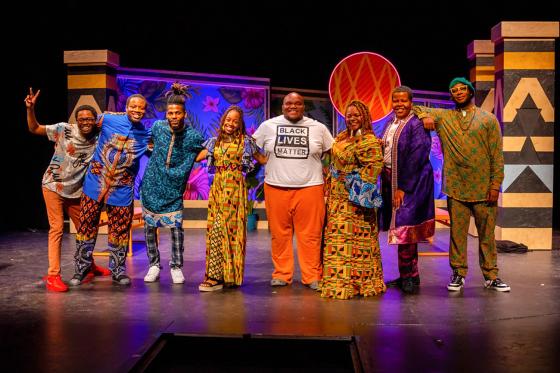Tuesday, October 25 was Olney Theatre’s fifth annual Internal Showcase! We presented scenes from eight plays that we are considering to fill 2-3 non-musical slots in the 2023-24 season and invited members of our community to share what they want to see on our stages. Since 2018, this has been Olney Theatre’s way of counteracting its hierarchical decision-making model and sharing the power to voice opinions. These responses play a crucial role in helping our artistic leadership decide what plays we’ll be doing in the 2023-24 season.
Historically in American non-profit theatre companies, the artistic director, or a small leadership team, was solely in charge of choosing what plays to produce each year. Over the last forty years, many theatres have shifted to a more democratic process; many by hiring literary managers (their job is to read scripts submitted to the theatre and narrow the pool for leadership to choose from), involving students in the case of conservatory programs, and some by filling their board of directors with community members who are not donors.
WHY DOES IT MATTER?
If theatre is supposed to reflect our cultural “now,” wouldn’t you want a say in the stories you see? To really get why collective season planning matters, I’d ask you to turn the question back on yourself: why do you choose to see a play, or even a movie or TV show? To laugh, to escape reality, to empathize, to cry, to feel rejuvenated? Stories give us ways to deal with our present. In our inter- and yet dis-connected world of technology and the 24-hour news cycle, I feel constantly aware of, and at times overwhelmed by, climate crisis, the ongoing pandemic, and injustice around the world and down my street. While the narrative of history slowly unfolds, witnessing/telling fictional stories can give us perspective and a breather.
HOW SEASON SELECTION WORKS AT OLNEY THEATRE
Members of our 11-person artistic staff team read various scripts over 2-3 rounds, narrowing the pool of scripts each time. We met almost every week for two months to discuss the scripts we read. Olney Theatre does not solicit submissions directly from playwrights but rather gathers scripts for consideration through our professional networks, unsolicited scripts from DMV playwrights, word of mouth, recommendations from our staff, and sometimes scouring the internet. Our selection process is fluid and flexible, dependent on how the wind blows, what stories strike us, and, of course, whether licensing rights are available.
Eventually, we narrowed the plays down to eight and each was assigned to someone on our team, who chose an excerpt for the showcase and prepared to lead its discussion. Then, our super casting team, Irene and Taylor, got to work hiring actors for the event in record time!
Our artistic staff includes:
- Rebecca Dzida, Director of Education & Training/National Players & Communication
- Ambree Feaster, Dramaturgy Apprentice
- Josiane Jones, Director of Production
- Jason Loewith, Artistic Director
- Irene Martinko, Casting & Producing Fellow
- Kevin McAllister, Director of Curated Programs & BIPOC Artist Advocate
- Shruthi Mukund, Director of Community Engagement
- Jenna Place, Associate Artistic Director/Casting Director
- Taylor Roberts, Artistic & Casting Apprentice
- Chris Youstra, Associate Artistic Director of Music Theatre
- Sabrina Zanello Jackson, Education & Community Engagement Apprentice
THIS YEAR’S SHOWCASE
In its current imagining, the event is invite-only. We invite folks from all our constituencies: patrons, students, community members, staff, artists, volunteers, board members, and donors. We keep this confidentiality in order to protect playwrights. The playwrights whose work we read do not necessarily know they’re under consideration, that way their hopes aren’t dashed if their work isn’t selected and they don’t feel pressure to attend.
Each hour, a different play was given the spotlight: actors read a 25-minute excerpt cold; that’s a theatre term for reading out loud without ever seeing the script before! After each reading, we had a 25-minute open discussion about it with the audience—would you see this play? Do the characters and conflicts pique your interest? Does it uplift conversations that resonate with our diverse communities? In what theatre space could you see it?
All in all, eighteen actors participated in the readings, ten members of our staff and board of directors attended, and twenty-five community members joined in the fun!
REFLECTIONS AND WHAT-IFS FOR FUTURE SEASON PLANNING
Five years ago, Olney Theatre first cracked open the door to season planning, and it has been widening it ever since. Local artists were welcomed to the internal showcase in 2020 and the Community Engagement Committee was included the following year. Small steps towards a larger vision for a creative future where artists and audiences are in direct dialogue and deep relationship with each other. This is only the beginning!
While I am the community engagement apprentice, it is much more than a job to me. I believe building and being in community is what makes us human (and what most theatre-makers are striving for). As such, the internal showcase left me thinking back on who and what inspires my personal opinions about community engagement.
Serve here and now.
Theatre people love or hate the question “why this play here and now?” but the question is vital. Art should be local and timely. To not do so would be out of touch, right?
Being a not-for-profit theatre means that a theatre is a service organization; i.e.: the stories the organization tells need to somehow benefit its viewers. Some believe that gathering community input is as simple as tracking ticket sales and soliciting public surveys. I beg to differ because this maintains an imbalance of power between those offering help and those in need.
To truly serve, Olney Theatre needs to know what the folks we serve need now; what better way to do that than having folks (artists and non-artists) from Olney, Gaithersburg, Wheaton, Rockville, etc. making decisions? (Yes, I work at Olney Theatre, and the fact that I’m not from the area limits my contributions!) Also, we at Olney need to particularly amplify the input of those most marginalized in Montgomery County. As grassroots movements show us, the best way to meet people’s needs is to put those people in power; this is called “the leadership of the most impacted.” (Learn more here and here.)
“Ask them to help you build it and they’ll own it.”
This is a quote from Olney Theatre’s 2020 commitment to anti-racism. To me, Olney’s vision aligns brilliantly with “leadership of the most impacted,” a model that shifts our thinking from “majority rules” to giving those with the least power the most say; this is leveling the playing field through equity at work. And I’ll let you in on a secret: when those most impacted lead the way, everybody benefits!
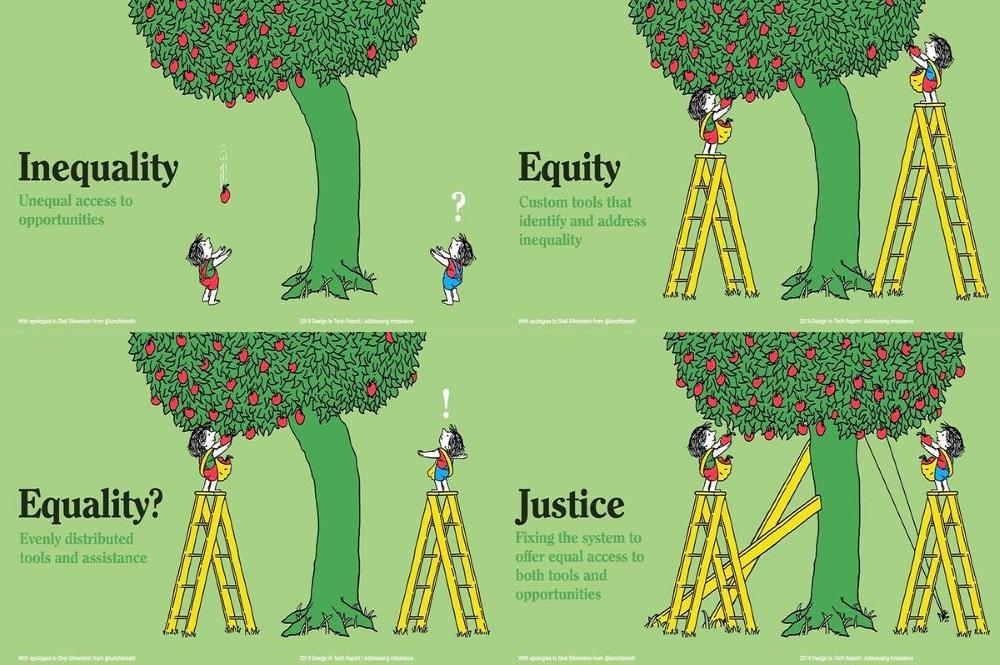 Image credit
Image credit
Obviously, not everyone is a theatre artist, but there are ways to welcome everyone, theatre aficionados and the occasional visitor alike, to give their input. Mixed Blood Theatre centers its Minneapolis community by:
- choosing plays with the input of its Disability, Latine, and Trans advisory councils;
- practicing radical hospitality (no one is turned away from seeing a play for lack of funds);
- giving back through theatre that isn’t “performance”, so to speak;
- Project 154’s public health advocacy,
- workplace inclusion workshops for local businesses,
- and offering their facility for community gatherings free of charge.
By leveraging their space as a place for change, they put themselves in the center of the issues and conversations pertinent to their community.
In our season planning process, one thing I didn't know how to ask and still don't know the answer to is, "what problems and events are impacting our community here in Olney? what's going on?” I’m left wondering, how differently would our season planning process be if this question (and thus our constituencies) were centered from the start? A la human-centered design.
“There is a conversation in the room that only these people at this moment can have. Find it.”
This is one of the core principles of emergent strategy, quoted from the eponymous book by adrienne maree brown. brown is a writer, facilitator, transformative justice organizer, pleasure activist, doula, and someone I consider a mentor, although we have never met. Emergent strategy is a philosophy and organizing method that embraces adaptability and change.
When I first came upon the concept, I immediately identified it as dramaturgy. Both emergent strategists and dramaturgs practice the art of facilitation, literally bringing people together in community and conversation. The quote above reminds me that every group space has inherent value. During the internal showcase, I remember wishing that more folks from the diverse communities around us had been able to attend the readings so that those most impacted by each play’s story could be the loudest voices responding to it. I still wish this, and at the same time, adrienne’s words remind me to feel gratitude for the conversations we did have that day with the folks who could attend.
Then again, part of brown’s message with this principle is that “Choosing what the work actually is, and with whom you will do it, has far greater leverage than how you perform it.” Which leaves me wondering, to what extent were we—our artistic team, staff, board, community members, featured actors, etc.—on the same page about what “the work” is? Did we conceptualize the goals of the event in the same way?
“To facilitate means ‘to make easy.’”
After the internal showcase, I found myself wondering, how accessible was the event? I think about this literally, in terms of the physical space of the event, and cognitively, in terms of our audience’s ability to follow the storylines enough to respond to these plays after only hearing one or two scenes, read cold at music stands. What if it were live-streamed, so those that couldn't take off other responsibilities or travel to the theatre could participate? Some of you reading this may be reminded of zoom fatigue and technological frustrations, but I also remember the deep feeling of community that those digital spaces created. In many of them, I felt more confident to speak up than I ever did at in-person events.
To facilitate is to make easy.
To facilitate access is to exponentially increase that ease. In other words, making events accessible may seem “too hard,” yet doing so makes the desired outcomes of those events infinitely more organic. Or as adrienne would say, emergent!
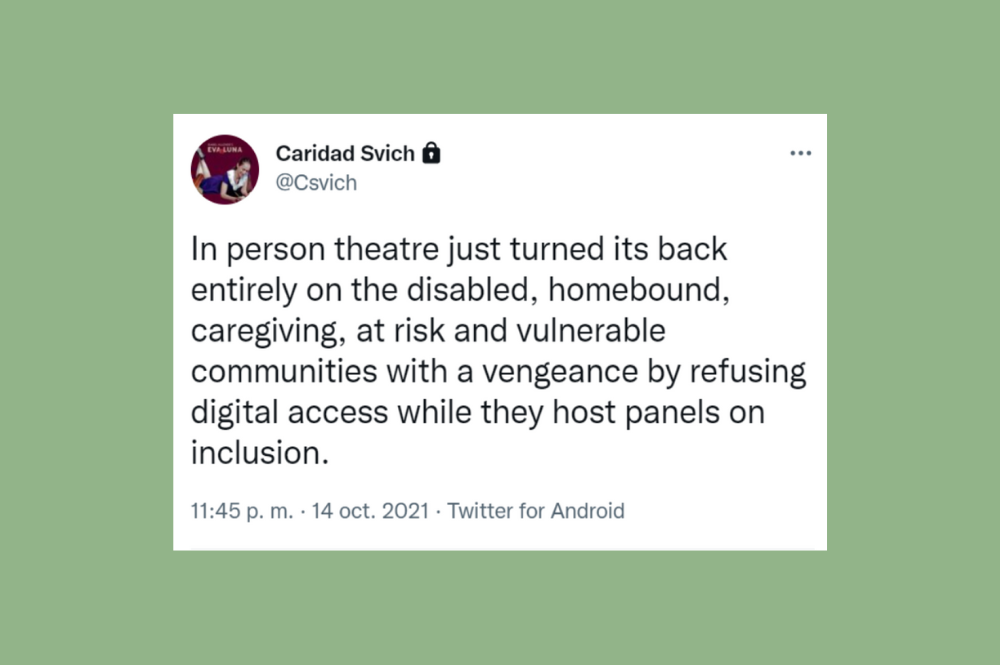 Image credit
Image credit
WHAT’S NEXT IN OUR SEASON PLANNING PROCESS
We will continue discussing which of the eight plays from the showcase feel resonant for next season and inquire about rights, whilst considering other scripts outside our narrowed pool to fill gaps illuminated by the internal showcase. That is as much as I, personally, know at this point. Whatever is to come, I do hope that we consider a question that adrienne maree brown leaves us with:
“'What is the next most elegant step?’... too often we come up with plans that don’t take into account the fog on the horizon. then we go off and the work doesn’t happen, perhaps can’t happen, and then we feel demoralized because our energy doesn’t flow into action. an elegant step is one that acknowledges what is known and unknown, and what the capacity of this group actually is.”
You might also like
Box Office: 301.924.3400
Open Wednesday - Sunday: 12:00 PM - 6:00 PM
